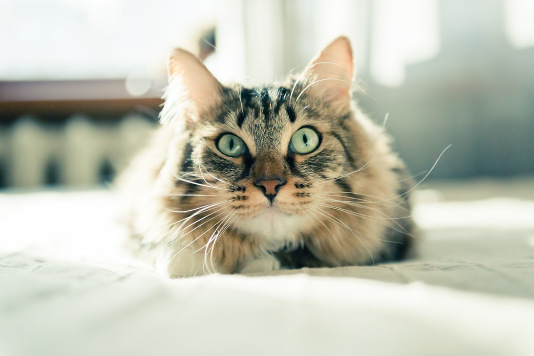This week we travelled to Esher to visit Sammy, a lovely 18 year old cat. Sammy’s owner thought he was ‘slowing down’ in his old age and wanted us to make sure there were no underlying health problems. His owner had had him since he was a kitten and in her eyes he hadn’t aged much so she was surprised to learn that, in human years, her dear friend was 88!
Putting her cat’s age into human terms allowed us to consider Sammy’s wellbeing from a different perspective. We discussed his routines – had she noticed any changes other than his decrease in activity level? Changes in drinking habits, appetite, energy levels and personality can indicate an illness that requires medical attention so she was absolutely right in calling us out. Thankfully, in Sammy’s case there were no other concerns and his physical exam and blood results all confirmed that he was in good health.
As a mobile cat vet, I get the unique opportunity to observe cats in their own environment and this can be a great help for any case but particularly those that involve a change in behaviour. As Sammy settled back down for a nap, his owner showed me his food, water bowl and favourite place to sleep and we talked about some of the ways that we could make life a bit easier for him as he grew older.
There are many things good cat owners can do to help their aging feline friends maintain a good quality of life. Here are a few of my most common suggestions:
Provide a litter tray indoors
Elderly cats, like humans, have a harder time getting around and things like cat flaps can seem like a significant obstacle as they get older. Combine that with a weak bladder and accidents start to happen, a distressing occurrence for both the cat and the owner. Even if your old cat prefers to go outside, they would probably appreciate the option of a litter tray sometimes.
Offer a variety of high quality foods
An elderly cat’s senses of smell and taste may not be what they used to be, yet adequate nutrition is more important than ever. If your cat seems less interested in their food and there doesn’t seem to be an underlying medical reason for the change, try offering a different type of cat food. Wet foods with a high meat content are often more readily accepted than bland dry biscuits, especially if they also suffer from dental disease.
Help them groom
A staggering 90% of cats over the age of 12 are affected by (often undiagnosed) arthritis. As regular feline grooming requires considerable flexibility, this is one of the first activities cats give up on as they age. The coat gets dull and matted and the nails become overgrown, even curling into the pads in some cases. Help them out with regular, gentle brushing sessions and trim their nails regularly.
Adapt their world to their needs
- Keep them warm — provide a heated blanket or cosy bed by the radiator or fire.
- Give them some peace — provide a place where they can rest away from visitors, children and loud noises.
- Get them checked out regularly by the vet — health problems are easier to treat if caught early. Arrange for a home visit to avoid stressful car journeys.
- Increase accessibility — make sure their food, water and litter tray are all within easy reach of their bed and if your house has stairs, consider providing dining and toilet facilities on each floor.
- Don’t forget to play — they may be old, but they still need mental stimulation. Catnip toys are great for cats of all ages as they can be as gentle or aggressive as they like with them.
Senior cats are very good at hiding their illnesses so we really have to make an effort to notice small changes in their behaviour. Even if your older cat seems just fine, you might be surprised how much they appreciate some of the above adaptations so it’s worth giving them a try. Your faithful friend deserves a comfortable retirement!
Resources
For more information about caring for older cats, take a look at our cat health page on the topic or see the following resources:
- AAFP senior care guidelinesFriends for Life Brochure — a downloadable brochure for owners of old cats
- International Cat Care Life Stageswww.icatcare.org/advice/life-stages — a good explanation of how we classify a cat as ‘mature’ vs. ‘senior’ vs. ‘geriatric’ based on a cat’s life expectancy and some good tips on how to keep cats of all life stages healthy


